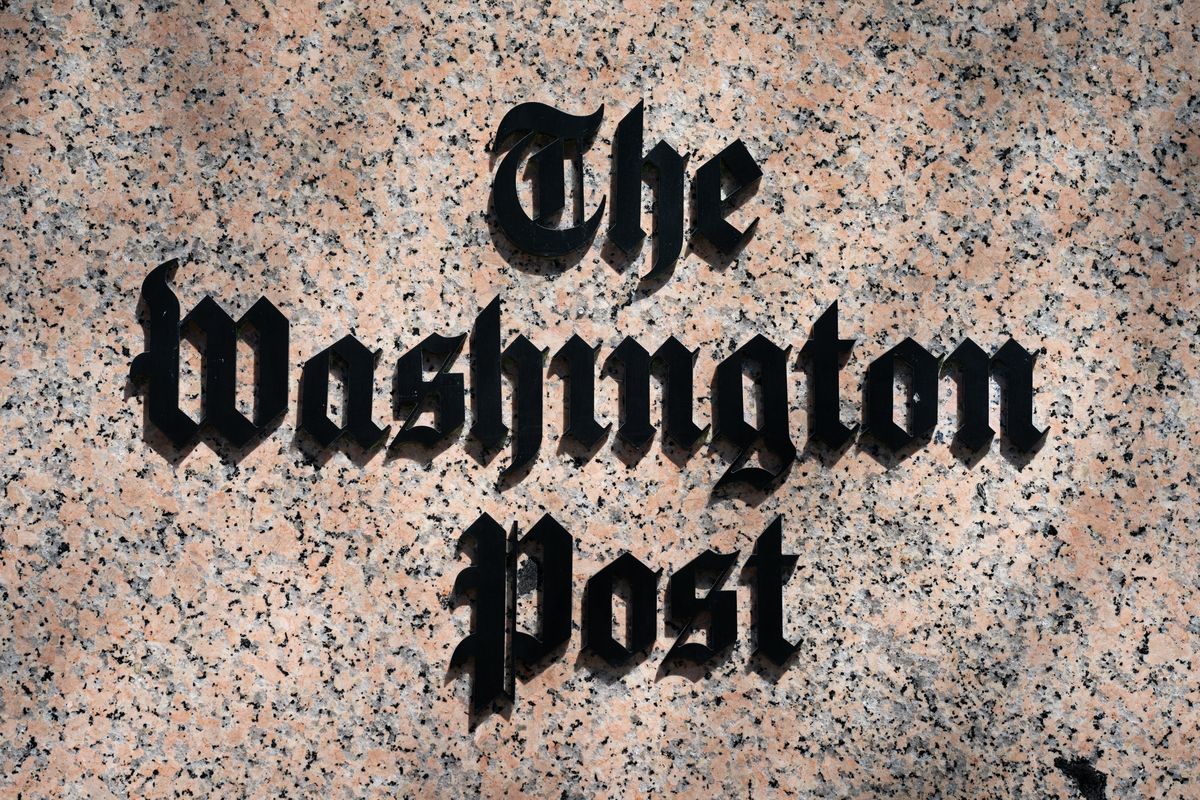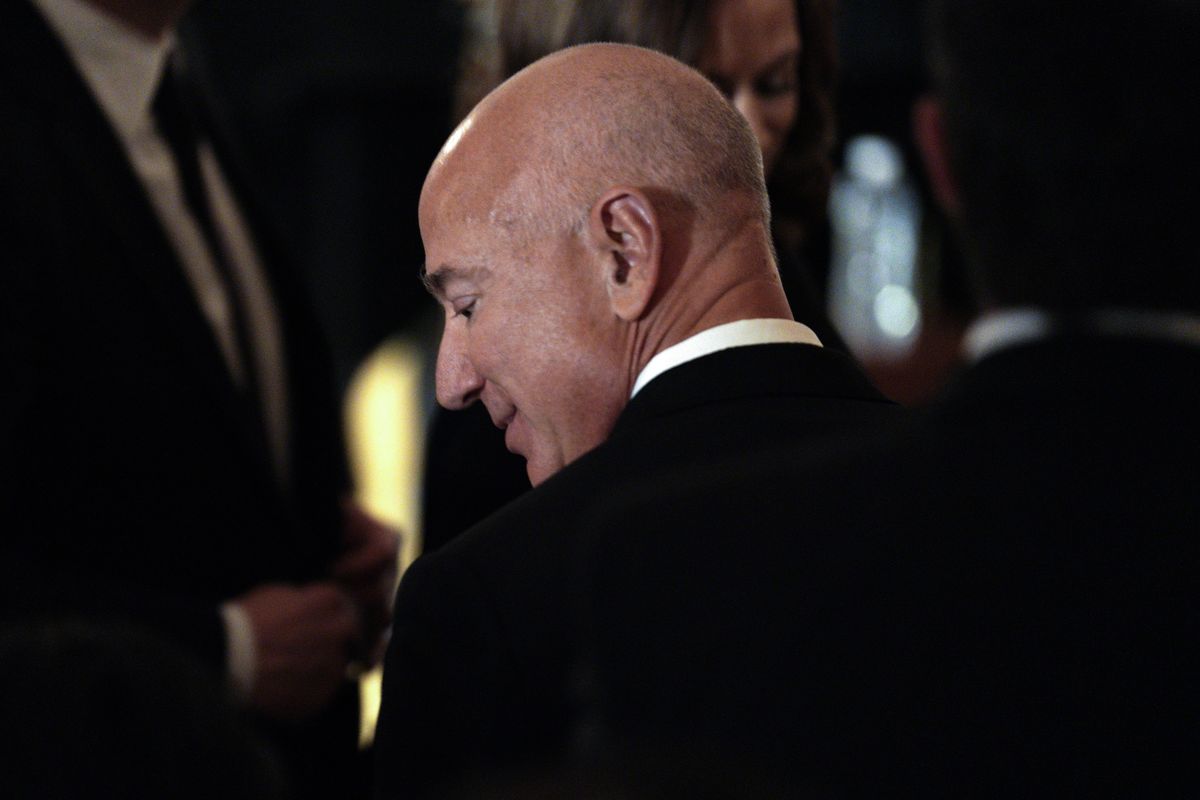Post owner Bezos defends endorsement decision
The Washington Post's logo near the entrance of its headquarters on K Street Northwest. (Sarah L. Voisin/The Washington Post)
Washington Post owner Jeff Bezos published an opinion piece Monday night on the news organization’s website, defending his decision Friday to end the paper’s practice of endorsing presidential candidates on its opinion page while lamenting that the move was announced so close to Election Day.
Bezos – who did not block presidential endorsements in the two campaigns since he bought the Post in 2013 – called his move to halt presidential endorsements “a principled decision” and also cast doubt on their usefulness. Bezos said his decision is aimed at restoring public trust in the news media.
“Presidential endorsements do nothing to tip the scales of an election,” he wrote. “No undecided voters in Pennsylvania are going to say, ‘I’m going with Newspaper A’s endorsement.’ None. What presidential endorsements actually do is create a perception of bias. A perception of non-independence.”
The op-ed, which appeared in Tuesday’s print edition, comes as nearly one-third of the Post’s 10-member editorial board stepped down Monday in the wake of Bezos’ decision.
The board members – all of whom have said they intend to remain at the newspaper in other roles – include David E. Hoffman, a 42-year Washington Post veteran who was awarded the Pulitzer Prize for columns on autocracy and resigned Thursday, the day before publisher William Lewis shocked the board by announcing the decision to cease a long-standing practice of issuing endorsements in presidential races. Board member Molly Roberts confirmed that she is stepping down. The third board member is Mili Mitra, who also serves as director of audience for the Post’s opinions section. Bezos made no mention of the resignations in his opinion piece.
“Let me give an analogy,” Bezos wrote. “Voting machines must meet two requirements. They must count the vote accurately, and people must believe they count the vote accurately. The second requirement is distinct from and just as important as the first.”
A draft of the Post editorial board’s planned endorsement of Vice President Kamala Harris, the Democratic candidate, had been written but was closely held by opinion editor David Shipley, and had not been shared with the full board before Lewis’ announcement, according to two board members who spoke on the condition of anonymity to describe internal discussions. According to reporting by the Post and other news organizations, Bezos made the decision to end presidential endorsements.
“I would also like to be clear that no quid pro quo of any kind is at work here,” Bezos wrote. “Neither campaign nor candidate was consulted or informed at any level or in any way about this decision. It was made entirely internally.”
Lewis has said Bezos did not see the endorsement draft or “opine” on it, and Bezos did not say in his piece whether he’d seen the draft.
Bezos did, however, express regret about the timing, which has prompted widespread criticism that he was attempting to aid Trump by suppressing the unpublished Harris endorsement, perhaps in hopes that the Republican candidate would be helpful to Bezos’ business interest if he defeats Harris.
“I wish we had made the change earlier than we did, in a moment further from the election and the emotions around it,” he wrote. “That was inadequate planning, and not some intentional strategy.”
Bezos also discussed revelations in news reports that Dave Limp, an executive of one of his companies, Blue Origin, had met with Trump the same day the presidential endorsements decision was unveiled.
“I sighed when I found out, because I knew it would provide ammunition to those who would like to frame this as anything other than a principled decision. But the fact is, I didn’t know about the meeting beforehand,” Bezos wrote. “There is no connection between it and our decision on presidential endorsements, and any suggestion otherwise is false.”
His varied business interests are prone to suggest the appearance of conflicts, he said.
“I once wrote that the Post is a “complexifier” for me,” he said. “It is, but it turns out I’m also a complexifier for the Post.”
While praising the Post’s journalists, he also made clear that he considers the status quo unacceptable. Without going into detail, he wrote that “we will have to exercise new muscles. Some changes will be a return to the past, and some will be new inventions. Criticism will be part and parcel of anything new, of course.”
He also expressed concern about public perception of journalism writ large.
“We must be accurate, and we must be believed to be accurate. It’s a bitter pill to swallow, but we are failing on the second requirement.”
The Post’s editorial board is part of the newspaper’s opinions section, which operates independently from the staff that provides news coverage. The remaining members of the board following Monday’s board resignations are Shipley, Charles Lane, Stephen Stromberg, Mary Duenwald, James Hohmann, Eduardo Porter and Keith B. Richburg.
“It’s extremely difficult for us because we built this institution,” Hoffman said in an interview before the public announcement of his decision to step down. “But we can’t give up on our American democracy or the Post.”
In a letter to Shipley about his decision to step down, Hoffman wrote, “I believe we face a very real threat of autocracy in the candidacy of Donald Trump.”
Hoffman – who took a buyout in 2009 but returned to the paper in 2012 to join the editorial board – has won two Pulitzer Prizes. In 2010, he was awarded the prize for his book “The Dead Hand: The Untold Story of the Cold War Arms Race and Its Dangerous Legacy.”
Roberts – who writes columns on technology and society, as well as serving on the editorial board – said she decided to step down from the board “because the imperative to endorse Kamala Harris over Donald Trump is about as morally clear as it gets.”
“Donald Trump is not yet a dictator,” she wrote. “But the quieter we are, the closer he comes – because dictators don’t have to order the press to publish cooperatively … the press knows and it censors itself.”

